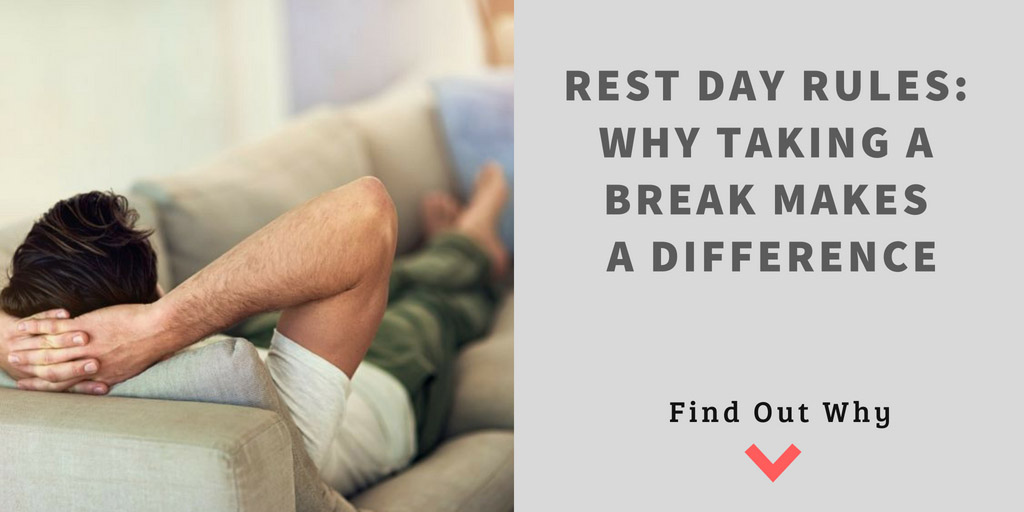Do you really need to take a rest day?
If you’ve been training for a long time, you’ve probably developed a sixth sense for muscle repair and recovery, energy levels, and the ability to keep making progress.
But it can take a lot of practice to tap into that skill. For most people, a rest day is an essential element of training to making gains.
The Trouble with Skipping Rest Days
Think of it like this.
You’ve probably seen a car pulled over on the side of the road, steam billowing from under the hood. And some poor driver standing there wondering what went wrong. Or maybe you’ve been in that situation.
The problem can usually be traced back to the engine overheating little by little. But in most cases, it’s preventable by checking coolant levels and the thermostat gauge.
It’s a lot like checking in with yourself about taking a rest day. If you ignore the warning signs of overtraining, and skip rest days when needed, you could end up having a breakdown.
And that’s the last thing you want when you’re on a mission to shred fat, build muscle, and transform your body.
Should you take a rest day? Probably.
Everybody responds to the demands of training and dieting a little differently. But even most pro bodybuilders work in rest days, or at least active recovery days that don’t involve heavy lifting and reps-to-failure training.
You’ll know it’s time to dial it back and take a rest day if you’re training hard for days, maybe even weeks and start to overheat. The longer you wait to pull over, check your gauges, and take a rest day when needed, the more likely you’ll encounter a potential breakdown caused by things like:[1]
- Musculoskeletal injuries: There’s nothing wrong with pushing hard in a training session. It’s how you stimulate growth. But try and train through pain because of a strained tendon, joint or muscle, and you’re setting yourself up for injuries that can sideline you for days, maybe even require surgery.
- Adrenal fatigue: Your adrenal glands work hard to supply your body with hormones to help fight stress and speed recovery. But when they’re overworked, bouncing back from a tough workout gets progressively more difficult.
- Burnout. You’re pumped to get to the gym, train hard, and do it all over again. But without any rest days, you start to lose your edge, maybe even lose interest in training. It can even show up as mild depression, mood swings, and increased irritability.
- Compromised immune system. Just got over a cold, and now you’re sick again? Overtraining can weaken your immune system and make you more susceptible to upper respiratory tract infections. The longer you go without a rest day, the more your risk for getting a cold goes up.[2]
- Longer recovery times. What the heck, you’re still pretty sore three days after a hard leg-day workout. That might be normal if it was your first workout in years. But if you’ve typically bounced back from workouts in 1-2 days, and now it’s taking longer, it a gauge indicator that you might want to take a rest day.
- Elevated cortisol levels. It’s the stress hormone. Without a rest day, cortisol levels can reach a tipping point that contribute to increased hunger, fatigue, depression, and nutritional deficiencies.
Rest Day Rules for Making Gains
When it comes to rest days, I believe your body tells you when to rest or how often you need to take a day off, or maybe even a week.
For me, I never plan a rest day. I plan to train every day but if my body feels like it needs to rest then I will take a day off to recover.
Need a rest day to keep making gains? Follow these rules:[3]
- Stick to your meal plan. A typical rest day means you’re not working out in the gym, and cardio is minimal. You’re burning less calories than a training day, but that doesn’t mean you should scale back your diet. Just stick to your meal plan. Your body needs the calories and macronutrients to grow.
- Massage and stretch. A rest day is a perfect opportunity to use that hour of gym time for a massage. If you don’t want to spend the money, myofascial release using a foam roller and some warm-up activities followed by stretching will help speed recovery.
- Practice active recovery. Taking a rest day isn’t a prescription for sitting on the couch doing nothing. Be active, just limit the intensity. Go for a walk, easy bike ride, or short hike.
- Relax. Elevated cortisol levels from stress (which can come from overtraining, and other stressors in your life like work, relationships, finances, etc.) can have a negative impact on metabolism, recovery, and growth. Take a rest day to relax, hang out with friends, and destress, maybe even practice meditation or mindfulness.
- Get your Zzzs. Lack of sleep is another factor that can contribute to stress, elevated cortisol levels, and symptoms linked to overtraining. If you’re feeling worn down, take a rest day and carve out time to get a decent night’s sleep. You can’t really catch up on sleep, but a solid 7 to 8 hours a night is ideal to support muscle repair, recovery, and growth.
When you learn to pay attention to the warning signs of fatigue and overtraining, taking a rest day can be just the thing you need to do to avoid overheating.
Should you take a rest day? Let’s discuss on Facebook.
References
1. Kreher, J., et al. (2012). Overtraining syndrome. Sports Health. From: https://www.ncbi.nlm.nih.gov/pmc/articles/PMC3435910/
2. Jenkins, M. (2018). Sick and tired athletes. Rice University. From: www.rice.edu/~jenky/sports/fatigue.html
3. Thiefels, J. (2018). How to have productive rest days. American Council on Exercise. From: https://www.acefitness.org/education-and-resources/lifestyle/blog/6527/how-to-have-productive-rest-days

